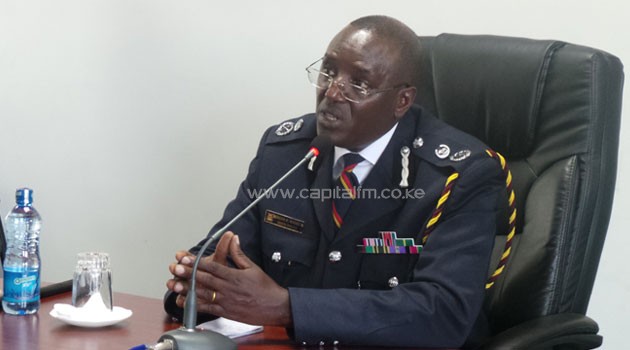
The Police Working Reforms Group argues that the current number of days is insufficient for the public to extensively provide information to be used during the ongoing police vetting/FILE
The Police Working Reforms Group argues that the current number of days is insufficient for the public to extensively provide information to be used during the ongoing police vetting.
Speaking to journalists on Tuesday, the Independent Medico Legal Unit Executive Director Peter Kiama said the success of the exercise will be determined by the degree of public participation.
“It is our considered opinion that the timelines that the commission has been setting for the public to submit their information on police officers for the purposes of vetting is grossly inadequate,” he stated. “The seven days given by the commission for the public to submit information on 182 Senior Assistant Commissioners and Assistant Commissioners of Police can hardly be sufficient.”
“We wish to remind the commission that the legitimacy of the vetting process will solely be determined by the levels of public participation. We recommend at least 10 working days for members of the public to collect, compile and submit information to the commission,” he stated.
On this ground, the group asked the commission to consider extending these timelines, “starting with the extension of the current deadline from January 17 to 24.”
For the public to forward any information, the group has provided the email policevetting@gmail.com and mobile number 0734 520 500.
Regina Opondo, the Executive Director, Constitution Reform Education Consortium also asked the vetting panel to widely probe the officers’ human rights record.
“Whereas financial probity is a critical component of the vetting exercise, it is our considered view that this one aspect is taking up almost the entire vetting time at the expense of probe on questions of integrity and human rights, professionalism and competence,” she opined.
She noted that as such, “the commission runs the risk of being perceived as a financial auditor with the resultant effect of watering down the goal of ascertaining suitability and competence of police officers.”
The applicable vetting standards include officers’ satisfaction of entry and training requirements, their professional conduct and discipline, integrity, financial probity, and respect for human rights.
So far, the vetting exercise has seen three senior officers – Francis Okonya, Peter Eregae and Jonathan Koskei, all of police headquarters – retired.
The vetting process is being conducted pursuant to the provisions of the Constitution Article 246 and National Police Service Act (2011) Section 7(2) and (3) which stipulate that members of the National Police Service shall undergo vetting to assess their suitability and competence.
The overall objective of the vetting is to build confidence and trust in the National Police Service.
Officers who satisfy the commission with regard to competence and suitability will be retained and those who do not will be removed from the service.









































